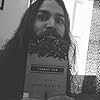Megan
asked
Scott Hawkins:
Some really excellent world-building in The Library at Mount Char. It felt like a mix of different mythologies converging together, sort of a re-alignment of all our theories and beliefs and legends. What gave you the idea for the library, and for the scale of its studies?
Scott Hawkins
This answer contains spoilers…
(view spoiler)[It was about a zillion little things rather than any one big one. A full answer would be about as long as the book itself, but just to give you an idea:
The core notion came from this guy who lived down the street from me when I was about 10 or 12. He had a pretty big library of silver age science fiction books and magazines that he'd let me borrow. It was great stuff, but it was heavily slanted towards what was popular from when he was a kid in the 1950s. So for a long time I had more reading in common with guys my parents age than my own. It eventually occurred to me that in terms of reading culture, I had for all intents and purposes grown up in the 1950s (I was born in 1969).
That kind of mingled with an idea I worked with a lot in college. There's a thing called the Sapir-Whorf hypothesis that says the language that you speak to a large extent determines the things that you're capable of thinking about.
So the core notion of Mount Char when I started writing was of this guy who'd been born a looong time ago, back when language was very different. Different language gave you different ways of looking at the world, right? Sapir-Whorf. So this guy, with his very old way of thinking, could do stuff that to modern eyes looked like magic. But at the same time, he himself was completely incapable of understanding things like cell phones and airplanes. Then one day he decided to raise a bunch of his descendants in the old ways, and teach them how to do all these neat tricks he knew. That obviously mutated a lot as I was writing, but that was the core idea when I set out.
Another bit that I thought was fun was the idea that every hundred years or so physicists get convinced that they've got everything but the fine details worked out. ("No, really! This time we're pretty sure!") Then somebody discovers relativity or whatever and we're back to square one. I liked the idea that god set it up that way on purpose, and that it would go on forever. We'd always think we were right on the edge of understanding everything, and then "oh...wait," while God sits up there giggling trollishly.
And then I read a bit about pacific islanders whose belief is that the moon got created when Naoru the Great plucked out his eye and threw it up in the sky. (This was from a great book called Getting Stoned With Savages) I thought it would be kind of funny if not only were our ideas about physics significantly off, it turned out that something like that was what actually happened?
Plus I threw in a couple nods to a great-but-obscure story from the early 1900s called the The Night Land, and a couple more towards Lovecraft, and ...
Et. cetera. You get the idea. (hide spoiler)]
The core notion came from this guy who lived down the street from me when I was about 10 or 12. He had a pretty big library of silver age science fiction books and magazines that he'd let me borrow. It was great stuff, but it was heavily slanted towards what was popular from when he was a kid in the 1950s. So for a long time I had more reading in common with guys my parents age than my own. It eventually occurred to me that in terms of reading culture, I had for all intents and purposes grown up in the 1950s (I was born in 1969).
That kind of mingled with an idea I worked with a lot in college. There's a thing called the Sapir-Whorf hypothesis that says the language that you speak to a large extent determines the things that you're capable of thinking about.
So the core notion of Mount Char when I started writing was of this guy who'd been born a looong time ago, back when language was very different. Different language gave you different ways of looking at the world, right? Sapir-Whorf. So this guy, with his very old way of thinking, could do stuff that to modern eyes looked like magic. But at the same time, he himself was completely incapable of understanding things like cell phones and airplanes. Then one day he decided to raise a bunch of his descendants in the old ways, and teach them how to do all these neat tricks he knew. That obviously mutated a lot as I was writing, but that was the core idea when I set out.
Another bit that I thought was fun was the idea that every hundred years or so physicists get convinced that they've got everything but the fine details worked out. ("No, really! This time we're pretty sure!") Then somebody discovers relativity or whatever and we're back to square one. I liked the idea that god set it up that way on purpose, and that it would go on forever. We'd always think we were right on the edge of understanding everything, and then "oh...wait," while God sits up there giggling trollishly.
And then I read a bit about pacific islanders whose belief is that the moon got created when Naoru the Great plucked out his eye and threw it up in the sky. (This was from a great book called Getting Stoned With Savages) I thought it would be kind of funny if not only were our ideas about physics significantly off, it turned out that something like that was what actually happened?
Plus I threw in a couple nods to a great-but-obscure story from the early 1900s called the The Night Land, and a couple more towards Lovecraft, and ...
Et. cetera. You get the idea. (hide spoiler)]
More Answered Questions
Erik
asked
Scott Hawkins:
Hi Scott! Mt. Char was mind blowing, thank you! How long had you been holding on to the idea of Mt. Char before you were able to put it into words on paper? Do you have any more ideas percolating? Have you read any mind blowing books yourself? another favorite of mine is "A fistfull of Sky". crazy good!
About Goodreads Q&A
Ask and answer questions about books!
You can pose questions to the Goodreads community with Reader Q&A, or ask your favorite author a question with Ask the Author.
See Featured Authors Answering Questions
Learn more





